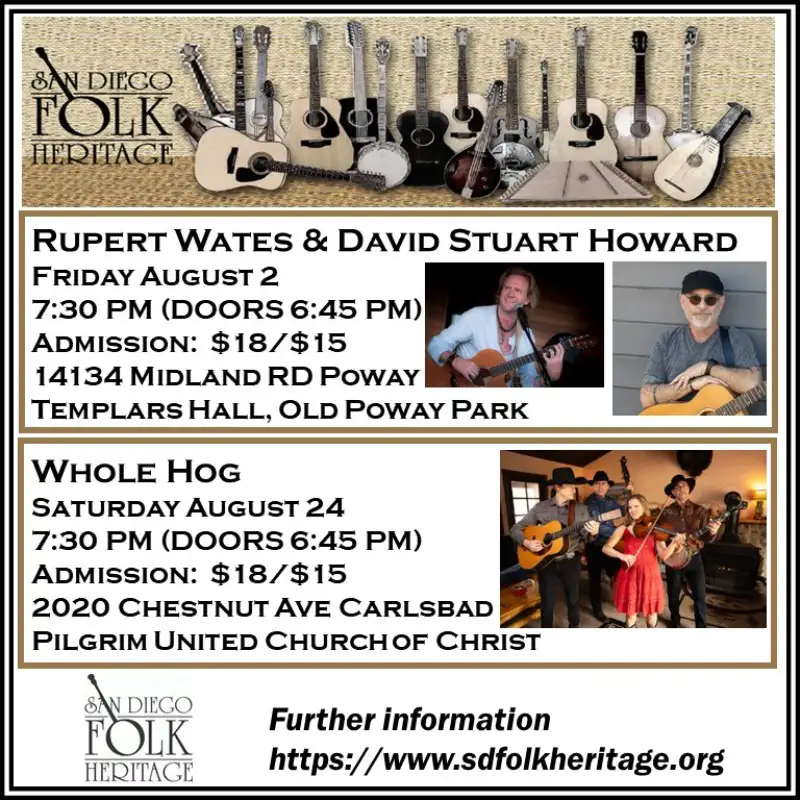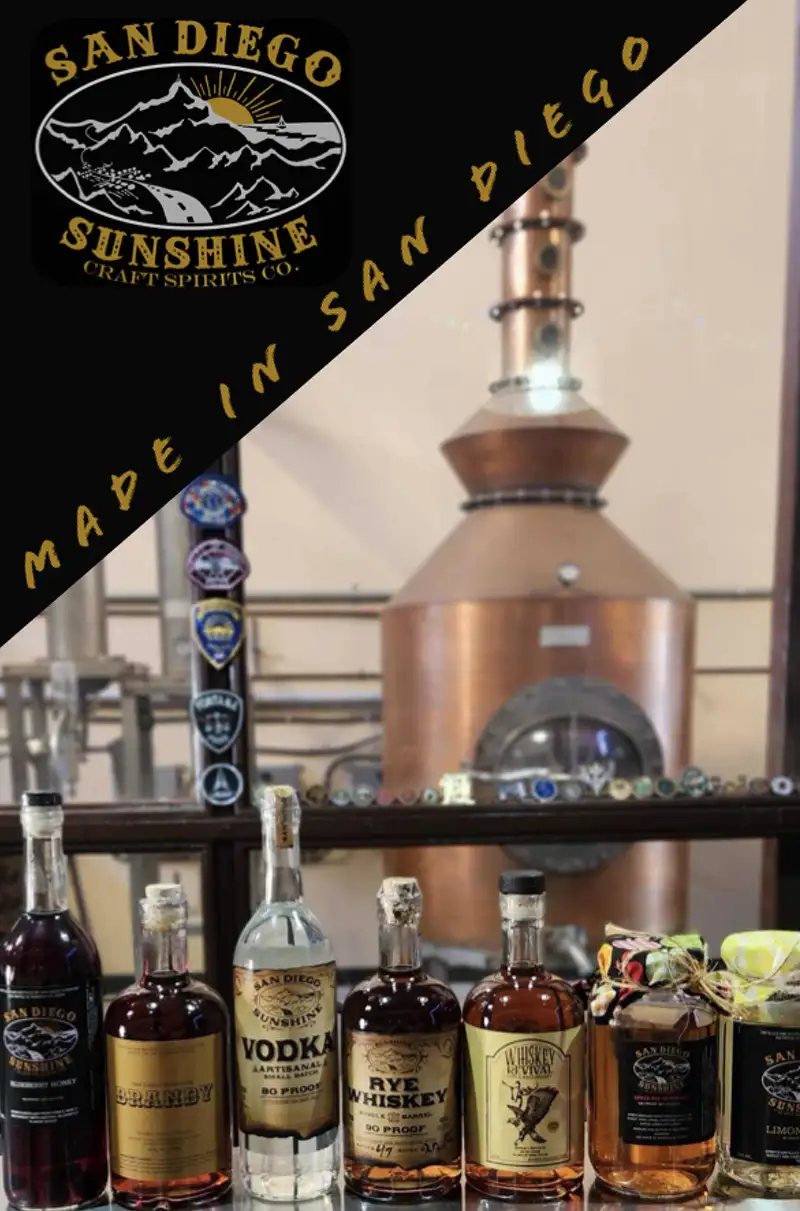Featured Stories
Dana Duplan: The Man with Nothing to Prove
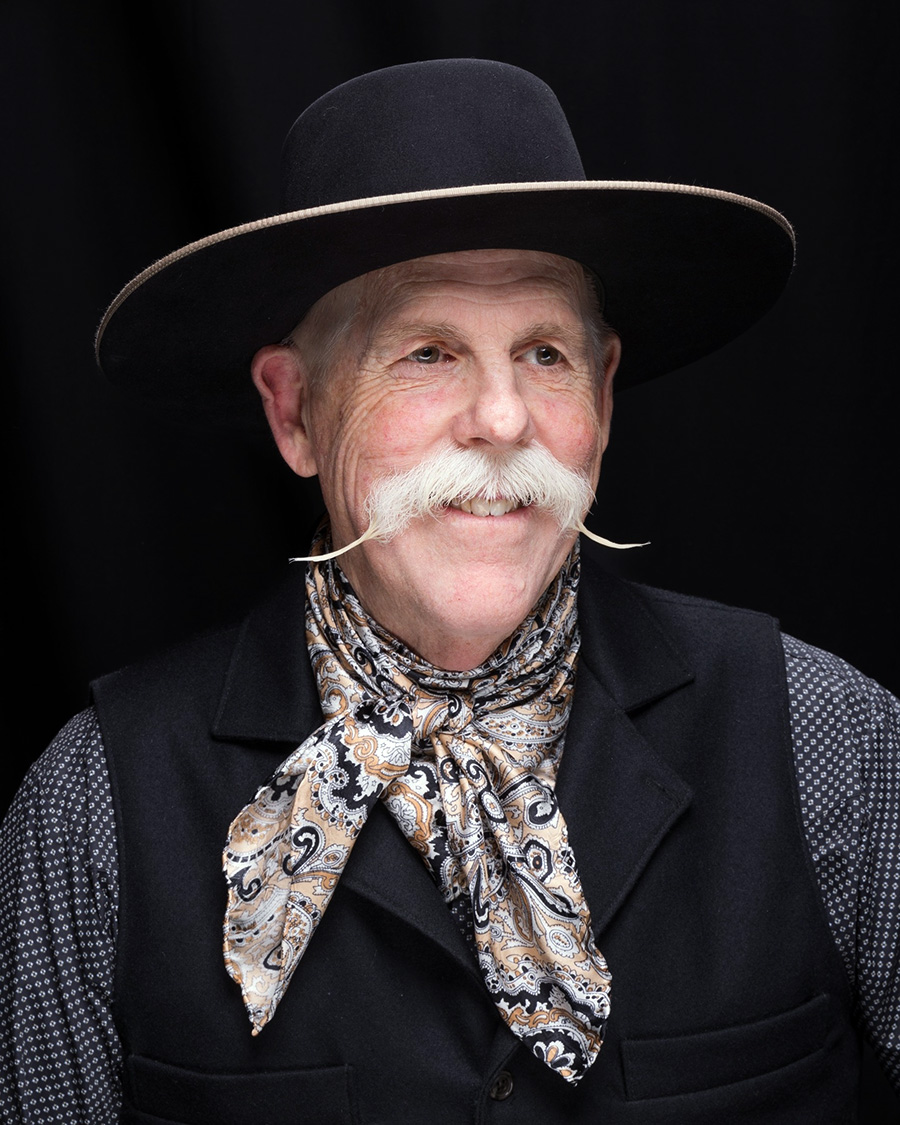
Dana Duplan
Some know him as the man with the handlebar mustache, others as the rippin’ blues guitarist or the Western Troubadour. Dana Duplan wears many hats in niche genres. And, in my opinion, he excels at them all. I sat down with him over a cup in a loud coffeeshop. He was, per usual, soft spoken, funny, and articulate. I was eager to learn more about The Man with the Duplan I have come to know and love in the Ramona music scene. I already knew that his history in music ran deep, but Dana’s is truly a Grand Canyon. We’ll get to everything. Often in articles like this we start at the beginning. Today, I wanted to start in the present. Because, lucky me, that’s the Dana I know best.
“The solo project is a relatively new thing for me. It’s been a long-term goal that took a long time to achieve, and it really just started as I was thinking about retirement from my day job and ways to improve my skill set.” So, Dana began testing the waters at open mics. He would try out songs to see how it worked and gained confidence. “I began taking some voice lessons and really hitting it hard, focusing on the solo project because I’ve always been a band guy.” Plus, the transition of being a guitar player that sings sometimes to a singer that plays guitar to an entertainer was a progression. His focus is on traditional music, folk, vintage-style country and western. “I have enough material to do a whole western show if that’s what it calls for, or I have enough material in country and early American music, as I call it, to do the same. Dana claims he accidentally stumbled into a “decades set” when he did a set from the teens. As in not the 20 teens but the 19 teens and just kept going through the decades. His passion is for older music but his next goal is to write more original material and do some more recording. As a Duplan fan, I am really excited about this. I had the honor of writing just one song with Dana and got a peek inside his notebook. The ideas are lush and powerful.
“Songwriting doesn’t come easily for me because I’m very particular. The people that I consider my role models essentially write literature. It’s a lot to achieve.” Dana then suggests the other side of his writing. The songs that come much easier to me are the more novelty and humorous ones. “The ideas just pop into my head,” he chuckles. “It’s a gift and I think of the weirdest stuff….my wife’s, like, that’s just Dana.” I love this. But there’s a serious side too. He loves the story.
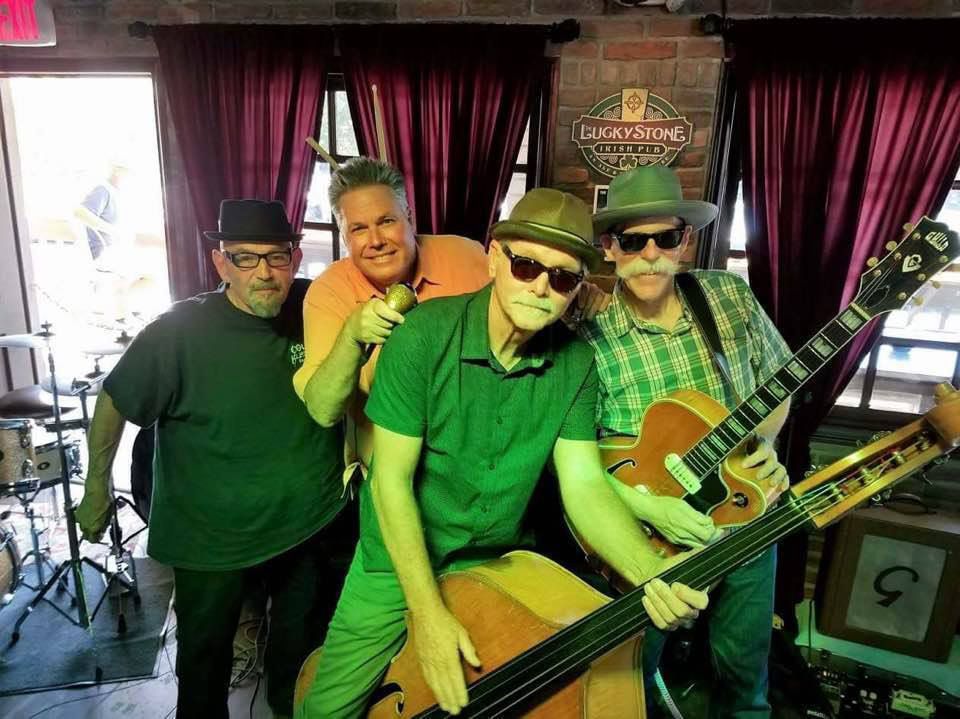
Dana (right) with the Chris Fast Band.
I’ve been at many shows where Dana sits in with a band and absolutely shreds a solo. People who don’t know his background might be surprised. “Interestingly, because I’m a hat guy and wear a hat and boots, people think country is only what I do, but my roots and influences go a lot deeper.” Dana is referring to being an electric blues player. He currently works occasionally with the Chris Fast Band. He claims that when people who know him from the blues world see him do his solo thing they might say, “I didn’t know you did this! You need to do more of that!” And when people from the folk world see him do the electric blues thing they say, “I didn’t know you could play guitar like that; you need to do that more!” He chuckles again…“you can’t win…it’s all me though.”
The Western Troubadour show was born out of an idea to play in rural California, where there are more horses than people. The troubadour thing is essentially an interpretation of other people’s music. That was the tradition of it. Performers would learn all this material and perform them on the streets or at medicine shows.” Dana fashions himself a historian and has a huge collection of music that goes back to his childhood. “When I was a kid, my money would immediately go toward records. I would always ask for albums on my birthday.” He is more about roots music than country in the sense that he’s into so many different styles of American music. That point might seem obvious to the trained ear. For example, his “Evacuating Chickens” song, set to appear on the Ramona Compilation album, is ragtime blues guitar inspired by talking blues styles like “Alice’s Restaurant.”
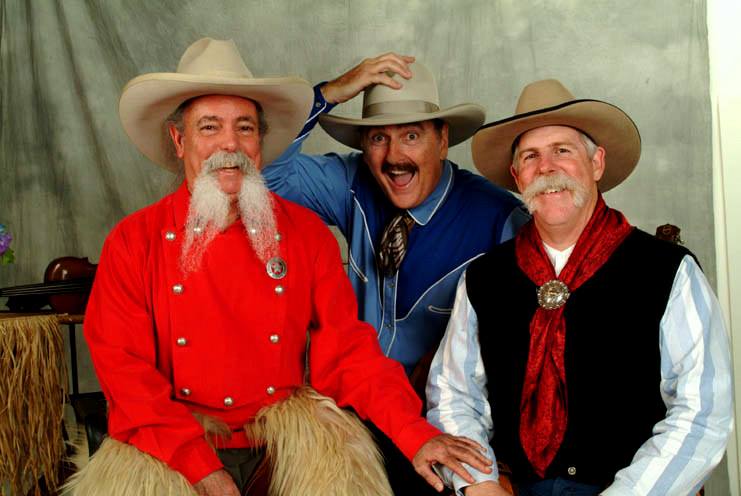
Dana with the Kahuna Cowboys.
I wanted to shift gears and talk more about Dana’s history in bands. There’s no surprise here—a Hawaiian cowboy jug band, “Kahuna Cowboys Jug Band,” with a t-shirt recently purchased off eBay is yet to be seen by Ramona artist Justin Craddock. I really want to see this. And the above-mentioned blues and West Coast blues band from Chris Fast. I wanted to learn more about the Cadillac Wreckers. In case it’s not obvious, this is a play off “Cadillac Records.” What a great band name. Born in 2009 or 2010, this started as a partnership between Dana and harmonica player Dane Terry. “We clicked right away and literally sat down and said, ‘What do we wanna do?’ You can hear the recording, though released more as a demo, on iTunes with originals mixed in. “Too Much Mondays” was recently heard on Cathryn Beeks Listen Local Radio. “So, we had a long run…with steady shows at Humphreys Backstage Live, festivals like Gator by the Bay, Wynola Pizza, and Heroes for years.” It was traditional blues, harmonica-based jump blues, which is more up-tempo swing and some of the more traditional Chicago style.
Then tragically, in February of this year, Dane passed away. “We did a show on Saturday night, and Sunday we were texting back and forth, ‘Great show last night, it was a lot of fun, look forward to the next time.’ And on Monday morning, on his way to work, he was killed in a motorcycle accident by a driver that ran a red light. So, everything on my phone was all about “great show” and the next was “Dane’s gone.” It’s almost like you didn’t believe it. Like you could go from all the fun and excitement and joy to that in less than two days. It’s hard. With that band, there was never really any negativity. All of my band associations have been long term, which goes back to playing what you enjoy playing and having it be easy.”
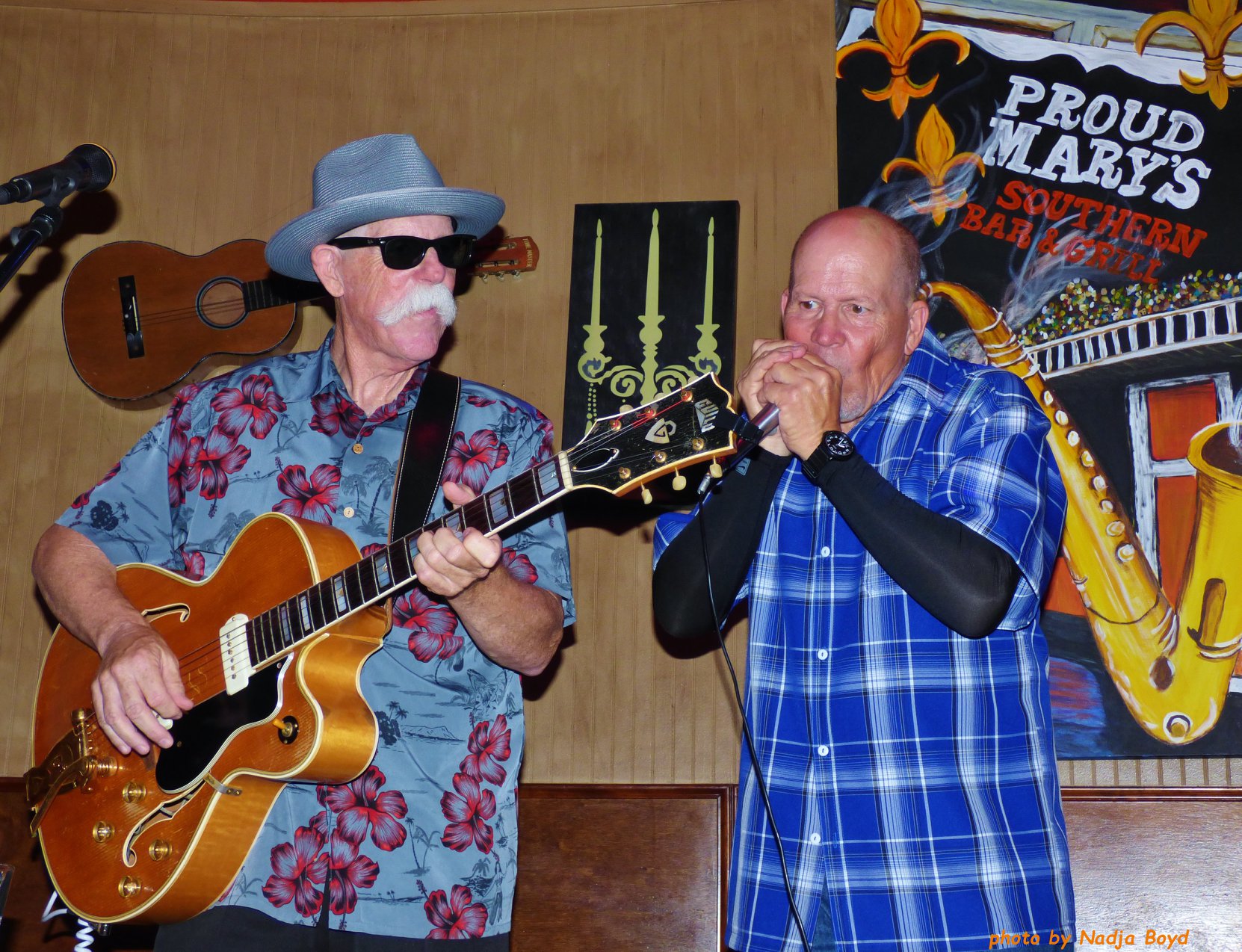
Dana and Dane Terry. Photo by Nadja Boyd.
This says a lot about Dana Duplan. He’s just a joy to work with—no drama. I wanted to go deeper. I asked him about his first band, and it jogged a memory. In fact, he recently came across a little review. “I was in bands in high school, mostly with the same guys. We never really had a name that stuck, but I was reading this review of a show we did. One of the things I was part of was called the Folk, Funk, and Blues Club. In the late ’60s, early ’70s, there was a big divide between the folkies and the blues men. “It’s funny now looking back,” says Dana. “The folkies would sit on a stool with their legs crossed playing an acoustic guitar, then we’d get up with our electrics and blow them out of the water.” This nameless group was called Festoon for a while, then Mulch, then Preparation H and the Hemorrhoids. “My mom nixed that one. Don’t put that in there, he says.” ME: “Oh, I’m putting it in there.” So anyway, his blues rock band plotted to raise a ruckus with three drummers and all kinds of stacks and gear and the president ended up in tears when they just blew the roof off the joint. As a result, Dana’s first review talked about how his band had nothing to prove. Knowing what I know about Dana now, this sentiment stuck.
Now that I’ve got all this wonderful music history, I just had to know about the mustache! Here’s what he said. “During my first two years of high school there was a dress code. Your hair couldn’t touch your ears or be over your eyes and you couldn’t have any facial hair. It was sort of the end of the hippie era so we all thought that was unconstitutional! So, they laxed the dress code and everyone that could grow facial hair did. So, I grew a mustache. I shaved it off once for my high school senior picture and that picture still haunts me. I grew it right back. It’s part of me!”
Now I know so much. But I knew Dana had some extra stories for me. I asked for them and here are some gems.
“The first bar gig at age 16 was for the brand new opening of this bar called The Snails Pace and we agreed to do the job for $30. We did our show and the owner said we didn’t make $30 to pay you guys. So, we tried to fight that and decided we were entitled to the microphone stand that was on stage as our payment. That’s one I remember. Another is one of the college dorm parties up on several floors. We played a ’50s dance and came in on my friend’s motorcycle. We took it up the elevator and rode into the dance hall like the Fonz from Happy Days.”
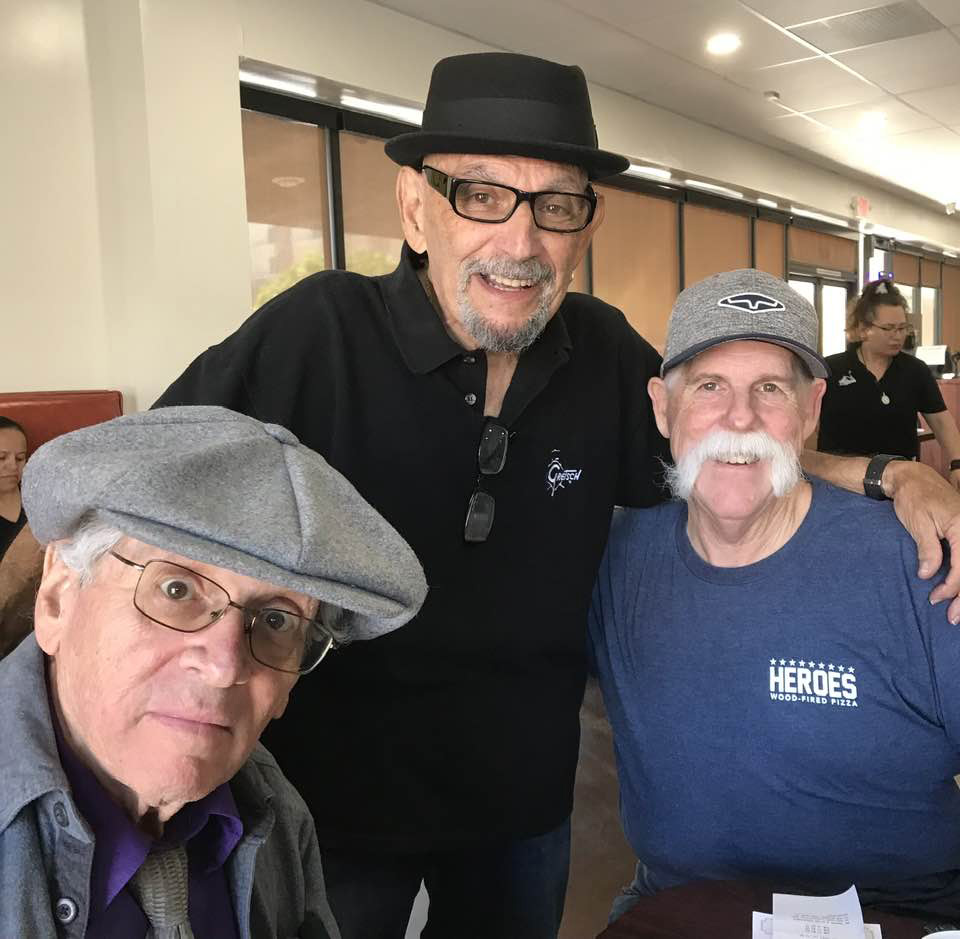
Dana with Robin Henkel and Al Schneider. Photo by Sam Castellano.
Nothing to prove, right? “When I look back, I’ve always been who I am. We haven’t even gotten to the good stuff.” So, I asked for the good stuff. “I moved out of LA to the Tehachapi area and formed a country band called Redeye. We had a good run of maybe 12 years with a big following in a small town. We entered a national contest called The Wrangler Country Showdown and in 1985 we won the state championship and got to go to Nashville to compete in the nationals. If we won that, we could have gotten a recording contract of $50,000. We made arrangements that if this is our calling, we’re gonna make it…we didn’t, but from our little town over 30 people flew out to support us. We had red and white jackets with our logo on it. And from the pictures, there were all these red and white outfits in the Nashville airport. It was a very stressful experience…but we were too country for country. Sweethearts of the Rodeo won. Anyway, we missed our calling but continued to play until I moved to San Diego.”
There, Dana joined band called The Nightcrawlers, which was traditional blues. They were together for 8-10 years and played mostly North Country coastal Encinitas and Carlsbad and got nominated for the SDMA in the early ’90s. He then played with Chet Cannon in Chet and the Committee and would host some blues jams.
After that was Cadillac Wreckers, among other notable projects including the Culhanes and the Hotshot Drifters. So, here we are or as much as I could fit into this article. “When I look back to when I first started playing guitar at 10, I’ve just been driven by music and the pursuit of improving my craft. It’s never come super easy for me, and I’ve always had to work for it, but I’ve always had the drive. Thinking back on my 10 year old self vs. myself now, I have more drive to keep moving it forward. I get more self satisfaction out of that than anything. It’s like I’m still growing. And just who I am.
And maybe that just about sums up the man with the Duplan. It’s just who he is. All drive…and nothing to prove.



